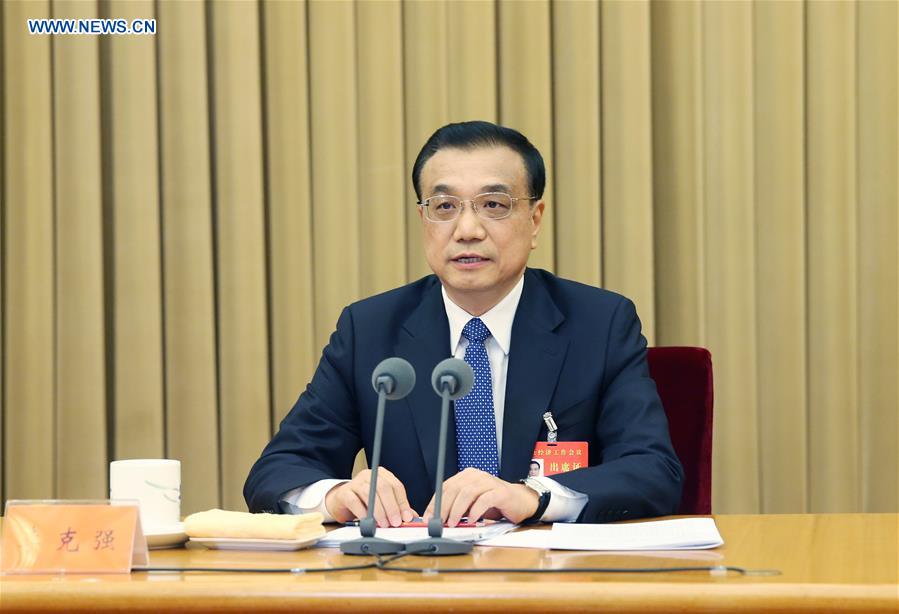

 |
| Chinese Premier Li Keqiang, also a member of the Standing Committee of the Political Bureau of the Communist Party of China (CPC) Central Committee, speaks at the Central Economic Work Conference in Beijing, capital of China. The conference was held in Beijing from Dec. 18 to Dec. 21. (Xinhua/Yao Dawei) |
BEIJING, Dec. 21 -- The central government will make fiscal policy more forceful and monetary policy more flexible to keep growth within a proper range in 2016, with an emphasis on structural reforms, an official statement showed Monday.
The current proactive fiscal policy needs to be more forceful by cutting taxes and raising fiscal deficit ratio gradually, according to a statement released after the Central Economic Work Conference, which opened Friday to review China's economic performance in 2015 and map out plans for 2016.
The prudent monetary policy needs to be more flexible to create appropriate monetary conditions for structural reforms and lower financial costs.
"Fulfilling the major economic targets of 2015 will mark the smooth completion of the 12th Five-Year Plan (2011-2015) and allow the country to develop on a higher platform," the statement said, adding that the economy maintained medium-high growth in 2015, the economic structure was optimized and people's livelihoods improved.
In the first three quarters, the economy expanded 6.9 percent year on year, generally, in line with government target at around 7 percent.
The country's economic growth still enjoys sound fundamentals, with enormous potential, huge resilience and ample room for further growth, the statement said.
Meanwhile, there are still many difficulties and challenges, especially the problem of severe structural overcapacity.
Next year, China should continue to "keep economic growth in a proper range" and raise long-lasting growth impetus to pursue a sound beginning year for the 13th Five-Year Plan, the statement showed.
To promote economic growth, China should pay more attention to growth quality and efficiency, as well as to structural reforms on the supply side, the statement said.
China should intensify structural reforms, raise effective supply and make the supply structure more adaptable and flexible following an innovative, coordinated, green, open and shared development model.
Supply-side reforms will create a better environment for the upgrading of enterprises and sustain long-term economic growth, compared with demand stimulation that tends to be short-lived.
"Promoting supply-side structural reforms will be important as it means China can adapt to and guide the 'new normal'," the statement said.
To this end, China will make well-targeted industrial policies.
"Microeconomic policies should be flexible to improve the market environment, unleash enterprises' vitality and consumption potential," according the statement.
Facing the arduous task of structural reforms, five major tasks were identified -- cutting excessive industrial capacity; destocking; de-leveraging; lowering corporate costs; and improving weak links.
The government will offer more support for companies to upgrade their technology and equipment and reduce debt, and it will also foster emerging sectors and encourage innovation in technology, product and business models.
It also plans to improve agricultural production to ensure food security and stable income growth for farmers by modernizing infrastructure and technology.
In eliminating overcapacity, China will seek more mergers and acquisitions than bankruptcy liquidations.
A string of policies concerning fiscal and tax support, the handling of non-performing assets and caring for those out of work should be put in place, the statement said.
"China will roll out a mix of solutions to help companies in the real economy reduce their costs," said the statement.
The government should streamline administrative procedures and delegate power, cut taxes and fees, and bring down social security contributions to alleviate the burden on firms, it said.
China will also reduce its property inventory to stabilize the market partly by turning more migrant rural workers into registered urban residents, the statement said.
The statement added that China would take further de-leveraging steps to guard against and defuse financial risks.
Day|Week

 Spectacular aerial photos of the Three Gorges
Spectacular aerial photos of the Three Gorges Admit it! That is a High-way built by China
Admit it! That is a High-way built by China Photos of Beijing Film Academy student hit the Internet
Photos of Beijing Film Academy student hit the Internet Spectacular aerial photos of the Three Gorges
Spectacular aerial photos of the Three Gorges New balls please! Polish sports stars strip off for risqué calendar
New balls please! Polish sports stars strip off for risqué calendar A glance at life of Ukrainian models working in Chongqing
A glance at life of Ukrainian models working in Chongqing Contestants of Mrs. Globe pose for photo in Shenzhen
Contestants of Mrs. Globe pose for photo in Shenzhen
 Bikini models attend hot pot banquet in Hefei
Bikini models attend hot pot banquet in Hefei 118-meter-high Never-used Building in NW. China Demolished
118-meter-high Never-used Building in NW. China Demolished J-10B fighters with homegrown engine in test flight
J-10B fighters with homegrown engine in test flight